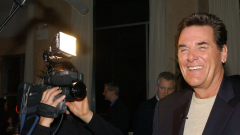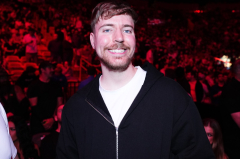NEW YORK – MARCH 11: Game show host Chuck Woolery appears at a programming event at the W Hotel … [+] March 11, 2003 in New York City. Game Show Network advertisers had the opportunity to play the game Lingo as hosted by Chuck Woolery. (Photo by Game Show Network via Getty Images)
Chuck Woolery, the affable, smooth-talking game show host turned right-wing podcaster—known for accusing the government of lying about the COVID-19 pandemic—has passed away at the age of 83. Woolery’s podcast co-host and friend, Mark Young, shared in an email early Sunday that Woolery died at his home in Texas, with his wife Kristen by his side, after experiencing breathing problems.
Despite some of Woolery’s controversial and highly disturbing comments over the years, he remained adored by many. This raises an intriguing question: Why? What allowed him to maintain such enduring appeal despite the backlash he faced? Exploring this paradox reveals much about his charisma, adaptability, and the enduring power of reinvention.
There’s no doubt that Chuck Woolery was more than just a game show host—he was an entertainer who understood how to engage audiences and build a personal brand. He was a master at the nuances of human interaction and a man of endless reinvention. Best known as the original host of Wheel of Fortune and for his witty banter on the wildly popular dating game show Love Connection, Woolery’s career highlights included hosting television staples like Scrabble and Lingo. Yet, he didn’t stop there. Woolery ventured into new territory with his podcast, Blunt Force Truth, where he voiced conservative opinions that sparked both controversy and loyalty among his audience.
Game-show Host Chuck Woolery (R) having fun with fellow game show host Todd Newton at the Worldwide … [+] Web Games Championship, September 9, 2006 in Los Angeles, California.
Woolery’s career began in music, where he co-wrote songs and performed with The Avante-Garde, a folk-pop band that earned a Top 40 hit. He even released a debut solo single before transitioning into television. His outspoken political commentary later in life further expanded his influence, sparking debates and earning him a polarizing place in cultural conversations. Whether shaping the reality dating genre, making waves with his political views, or mastering the art of live hosting, Woolery consistently reinvented himself to stay relevant.
Behind the camera, Woolery’s life was as colorful as his career. From his beginnings as a truck driver to auditioning for television, he became a symbol of resilience and adaptability. His ability to pivot—whether from hosting Greed to discussing chances for reelection on his podcast—underscored his knack for navigating challenges and aligning with the moment’s demands.
Woolery exemplified traits that are just as essential in a boardroom as they are on a game show stage. Here are some of the key lessons leaders can draw from his remarkable journey:
Decision-Making Under Pressure
Game shows thrive on unpredictability, and Chuck Woolery, like any seasoned leader, consistently rose to the challenge. Whether calming nervous contestants or steering a live show through unexpected mishaps, Woolery exuded confidence and poise. His decision-making abilities shone not only on-screen but throughout his career. Before becoming a television staple, Woolery pivoted from his early musical ventures—playing double bass in a folk trio and later forming the psychedelic rock duo The Avant-Garde in 1967—to hosting some of America’s most iconic game shows. Later in his career, he seamlessly transitioned into conservative commentary, identifying as a gun-rights activist and becoming a vocal presence in the political arena.
Despite Wheel of Fortune never quite matching the ratings success of Jeopardy! in its heyday, Woolery’s instincts were unshakable. He famously demanded a raise to $500,000 a year—equal to what host Peter Marshall was making on Hollywood Squares. When his demand wasn’t met, Woolery made the bold decision to leave the show, underscoring the decisiveness and confidence he carried throughout his career. Such moments highlight the kind of instinctive leadership responses necessary for navigating uncertainty, whether on a stage or in today’s high-pressure environments.
As a legendary game show host, Woolery also had a unique talent for avoiding the “urgency trap”—a common leadership pitfall where the pressure of juggling too many demands results in rushed, counterproductive decisions. This paradox undermines critical thinking, the very skill leaders need to remain innovative, efficient, and effective. Woolery’s ability to step back, think critically, and act intentionally—even when the stakes are high. exemplifies the balance leaders must strike today.
Studies emphasize that while decisiveness is crucial, leaders must pair it with reflective analysis to navigate complex challenges effectively. For example, findings published in the Harvard Business Review reveal how leaders who avoid urgency-driven decisions foster better innovation and long-term success. Woolery’s ability to balance thoughtful analysis with action is a powerful lesson for leaders managing polarized environments or addressing fears of retribution within their organizations.
LOS ANGELES, CA – OCTOBER 22: Host of the Game Show Network Show, Lingo Chuck Woolery poses on the … [+] set October 22, 2003 in Los Angeles California. (Photo by Carlo Allegri/Getty Images for the Game Show Network)
The Art of Empathy
There is no doubt that Woolery’s genuine ability to connect with people, whether contestants or audiences, was his true superpower. His apparent humor and warmth had a way of making even the most nervous contestants feel at ease, despite the high stakes of game shows. Mark Young, his podcast co-host and close friend, often reflected on Woolery’s rare gift for understanding others—a skill he carried into his later years as a conservative commentator on the podcast Blunt Force Truth.
This empathy wasn’t limited to the stage or microphone. Stories from people who knew him, such as David Bender and Kim Barnes, illustrate a man defined by kindness and humility. Woolery was described, above all else, as a genuine person—an increasingly rare quality in today’s world of public figures.
This insight feels particularly relevant in our current environment, where the polished images of public figures frequently unravel. Many have been trained to present themselves as one thing in front of the camera, only to be revealed as something entirely different behind the scenes. As I emphasize in my book, The Kim Kardashian Principle, this growing disconnect erodes trust and underscores the importance of authenticity—a quality leaders and public figures alike must learn to embrace to build lasting credibility and connection, regardless of whether others agree with their opinions. Think of Elon Musk: polarizing yet undeniably authentic. Authenticity, whether it invites admiration or criticism, is a cornerstone of trust.
Leaders can learn from Woolery’s approach. His ability to listen deeply and understand others was instrumental in fostering loyalty and collaboration. In the workplace, this approach translates into creating an environment where team members feel valued and supported. Woolery’s gift for connecting also serves as a reminder of the importance of identifying and nurturing potential mates—not just in the romantic sense as seen on his shows but also in forging meaningful professional partnerships. His legacy demonstrates that leadership involves balancing empathy with authenticity, creating relationships that stand the test of time.
LOS ANGELES, CA – OCTOBER 17: Host Chuck Woolery (L) talks to Miriam (C) and Lauren, Playboy … [+] Playmates who were contestants on the gameshow Lingo October 17, 2003 in Los Angeles, California. Lingo is the highest original program on the Game Show Network. (Photo by Carlo Allegri/Getty Images for Game Show Network)
Crafting Memorable Messaging
Few hosts are as closely associated with a signature as Chuck Woolery is with his iconic “back in two and two.” Britain’s game show host Bruce Forsyth had “three two one.” This catchphrase was more than a quirky sign-off; it became a cornerstone of his approachable brand—much like his impeccably coiffed hair—and helped make him unforgettable to his fans. Woolery’s ability to create engaging stories around contestants and their journeys transformed game show moments into captivating television, showcasing his talent as a master storyteller.
In today’s media-saturated environment, leaders that develop memorable messaging and compelling storytelling will better their chances of standing out. Woolery’s storytelling prowess contributed to his almost matinee idol status, surpassing his peer television icons like Pat Boone and Vanna White. His knack for weaving narratives not only elevated his career but also demonstrated how storytelling can be a tool to forge deep connections with audiences.
Many of you know I’ve spoken before about the power of storytelling in building strong brands. And research supports it. A study published in the International Journal of Applied Research explores how storytelling contributes to a powerful brand identity, using Coca-Cola as a prime example. The study highlights that effective storytelling creates a compelling and memorable narrative that resonates with audiences, fosters loyalty, and provides a competitive edge in the market.
Woolery’s ability to craft engaging narratives set a benchmark for leveraging storytelling to enhance personal and professional brands. His legacy offers a valuable lesson: in a world where attention is scarce, the ability to tell meaningful stories is an indispensable asset for building enduring relationships and standing out from the crowd.
BEVERLY HILLS, CA – MARCH 19: TV hosts Chuck Woolery, Bob Eubanks and Chris Harrison attend the WE … [+] tv presents “The Evolution of The Relationship Reality Show” at The Paley Center for Media on March 19, 2015 in Beverly Hills, California. (Photo by Alberto E. Rodriguez/Getty Images)
Balancing Stakeholder Expectations
The role of a game show host is a delicate balancing act, and Chuck Woolery mastered it with remarkable precision.





